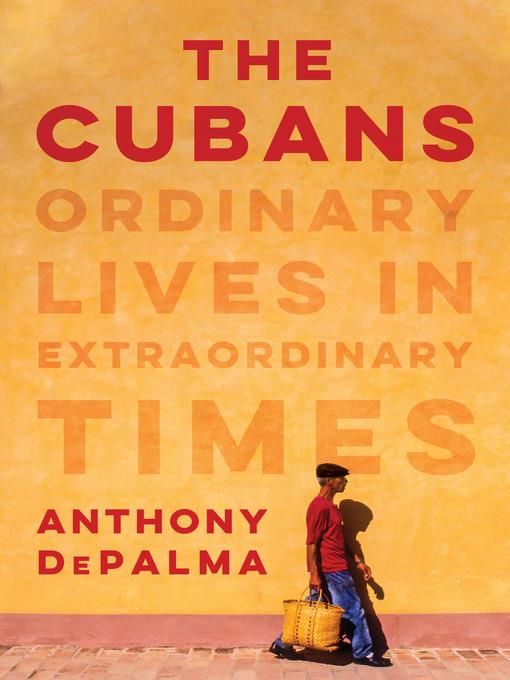
The Cubans
Ordinary Lives in Extraordinary Times
کتاب های مرتبط
- اطلاعات
- نقد و بررسی
- دیدگاه کاربران
نقد و بررسی

February 24, 2020
Journalist DePalma (The Man Who Invented Fidel) delivers a sensitive portrait of Cubans navigating their “bizarre mash-up of an economy” from the 1970s through 2018. Drawn from the eastern Havana neighborhood of Guanabacoa, DePalma’s subjects include Caridad “Cary” Luisa Limonta Ewen, a Communist party member and economic engineer of Jamaican descent, and artist Arturo Montoto, who returned to Cuba after a “self-imposed exile” in Chile and Mexico and makes “subtle social commentaries” in his still-life paintings. Though the U.S. embargo has created a culture of deprivation since 1960, the situation grew much worse, according to DePalma, during the “special period” in the 1990s after the dissolution of the Soviet Union left Cuba without its main backer. He movingly relates the story of one survivor of the 1994 sinking of the 13 de Marzo, a tugboat filled with refugees that witnesses say was attacked by the Cuban coast guard, resulting in the deaths of 37 people. Recent food shortages, uncertainty over the transition of power between Raúl Castro and newly elected resident Miguel Díaz-Canel, and a crackdown on private businesses and wealth accumulation, DePalma writes, have led to fears that more hard times are coming. In impressively specific detail, DePalma captures the suffering and resilience of ordinary Cubans caught between the political posturing of their government and the U.S. Readers will savor this intimate, eye-opening account.

Starred review from April 1, 2020
An intimate history of a "social paradise" that has sorely failed its people. In his latest, DePalma, a former Latin America correspondent for the New York Times and author of The Man Who Invented Fidel (2006), delivers engaging alternating narratives delineating the lives of regular people during two decades of strife and deprivation. The author shares frankly his bias in this work of revelatory personal histories--his Cuban-born wife was spirited away to America in 1960--and through familial testimony and his own observations, he reveals a country in dire economic distress, its original revolutionary mythology in shambles. DePalma maintains a laser focus on a few ordinary Cubans, including Cary, who was born to a Jamaican migrant and went on to study economic engineering in Ukraine in the 1970s. She returned to a series of promotions in the Cuban workforce and started a family in Guanabacoa, a gritty warehouse neighborhood just across the harbor from Old Havana. Cary's devotion to Fidel Castro's revolution was unshaken throughout her life, and she was amply rewarded by the government with housing and health care. Yet by 1994, when the Soviet Union's aid had dissolved and Cuba was undergoing intense economic hardship, street protests, and reckless attempts to flee the island, Cary recognized that "the classless society Fidel promised was a mirage." Outside of Cary's family, DePalma tracks Arturo Montoto, an artist who studied in Moscow and elsewhere, returning to Cuba deeply disillusioned and intent on skirting the system his own way; and several survivors of an ill-fated tugboat that was likely rammed by the Cuban coast guard in July 1994, killing more than 40 people (the Cuban government denied responsibility). DePalma's fictionlike narrative moves thematically (Realization, Reconciliation, etc.), and the author is especially good at revealing the stunning adaptability of a people thwarted at seemingly every turn. An obvious labor of love, years in the making, featuring meticulous research and an elegant narrative style. (maps)
COPYRIGHT(2020) Kirkus Reviews, ALL RIGHTS RESERVED.

April 1, 2020
Many Americans have lived so long with the Cuban revolution and its aftermath that their impression of the Cuban people forms little but a political stereotype, quite divorced from the island nation's present-day realities. Journalist DePalma (City of Dust, 2010) sets the record straight. He has interviewed dozens of Cubans, here focusing on just a few to give a portrait of life in the years since Fidel Castro's little band brought down the toppling Batista regime. For contemporary Cubans, everyday life is a struggle, with shortages of adequate food and needed medicines. Too often, their world has shrunk to the simple survival of their own families and neighborhoods. All this privation has made them particularly hardy and resilient, cobbling solutions to every problem, resorting to baling wire to hold their cars together, and even frying plantain skins when there's no other food. The revolution may have bestowed good educations, but job opportunities are scarce. As DePalma sees it, Cubans survive a maximum of prohibitions with a minimum of inhibitions. A bracing insight into human perseverance.(Reprinted with permission of Booklist, copyright 2020, American Library Association.)

May 1, 2020
To conservatives, Cuba is a communist dictatorship controlled by revolutionaries in the mold of Fidel Castro and Ernesto Guevara. Progressives laud Cuba for its achievements in health care, education, and sustainability. Lost in this duality are the millions of ordinary Cubans; most of whom have remained in Cuba and who carve out meaningful lives by working around bureaucracy, corruption, and deprivations inflicted by the U.S. trade embargo. Former New York Times correspondent DePalma (The Man Who Invented Fidel) uses interviews and personal narratives to shadow ordinary Cubans from the 1950s to 2018. The book revolves around Cary, an Afro-Cuban-Jamaican whose single mom cleaned houses in Havana's suburbs. Cary studied economic engineering in the Soviet Union and become a factory manager, senior official, and ultimately an entrepreneur. Her circle includes Arturo, an artist who turns a crumbling church into his studio; Lili, a loyal Communist; Jorge, an anti-regime activist; Mari, a health inspector; and various neighbors and family. DePalma is light on geopolitical and ideological context; for more historical grounding, readers should see Richard Gott's Cuba. VERDICT Overall, a rich, intimate, evenhanded narrative that reveals the Cuban people's resilience and resourcefulness amid oppression.--Michael Rodriguez, Univ. of Connecticut, Storrs
Copyright 2020 Library Journal, LLC Used with permission.

























دیدگاه کاربران